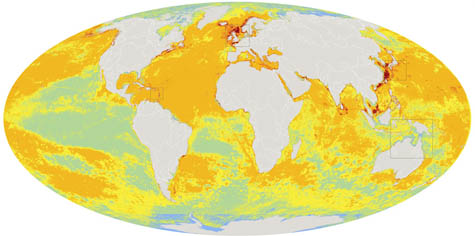UCSB Scientists Map Human Effect on Oceans
Increasingly "Dire" Image Predicted as More Data Is Recorded

For the first time, scientists have revealed a map showing the total human effect on the world’s oceans, meaning that it indicates how people have collectively influenced – positive or negative – the marine ecosystem in areas such as sea grass beds, coral reefs, continental shelves and the deep ocean. The map, drawn up by a team of nineteen scientists, was produced at the National Center for Ecological Analysis and Synthesis (NCEAS) at UCSB, and published on February 15 of Science.

The work, created by overlapping maps of seventeen different activities such as climate change and water pollution, enables scientists to look at the influence humans have had on the ocean as a whole. “This project allows us to finally start to see the big picture of how humans are affecting the oceans,” said lead author and assistant NCEAS research scientist Ben Halpern in a press statement. “Our results show that when these and other individual impacts are summed up, the big picture looks much worse than I imagine most people expected. It was certainly a surprise to me.” The study shows that human influence varies greatly from ecosystem to ecosystem; for example, the more populated areas such as coral reefs and submarine mountains are more heavily affected than the soft-bottom or open-ocean surface areas. “Our hope is that as more data becomes available, the maps will be refined and updated,” said principal investigator Fio Michelo in the statement. “However it will almost certainly create a more dire picture.” The result of this project is that it can now assist scientists in evaluating what type of activities can continue in certain areas of the ocean, and what kinds might need to be stopped or moved to less sensitive areas. “Humans will always use the oceans for recreation, extraction of resources, and for commercial activity such as shipping. This is a good thing. Our goal, and really our necessity, is to do this in a sustainable way so that our oceans remain in a healthy state and continue to provide us the resources we need and want,” Michelo was quoted as saying.



